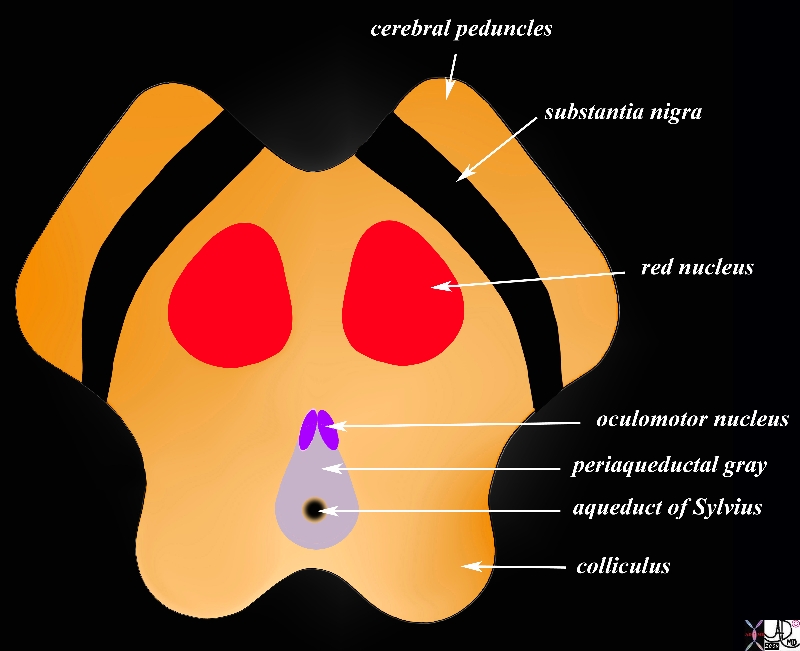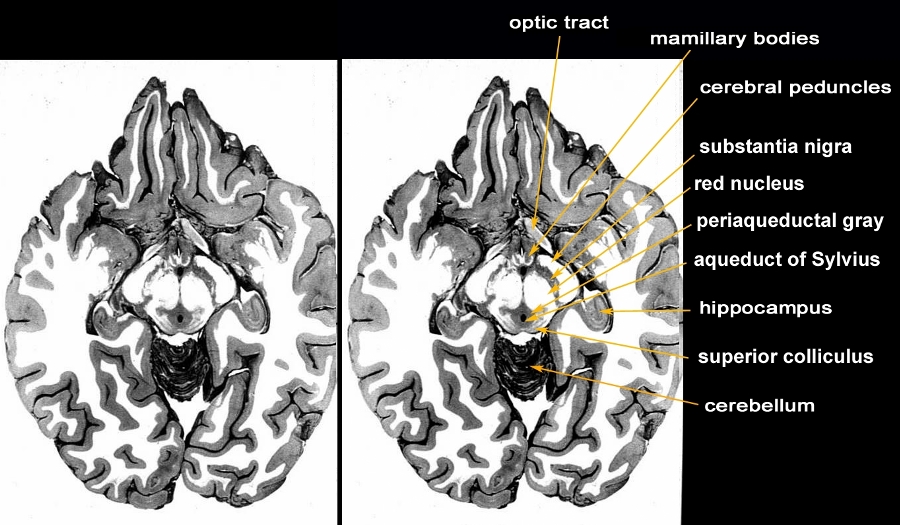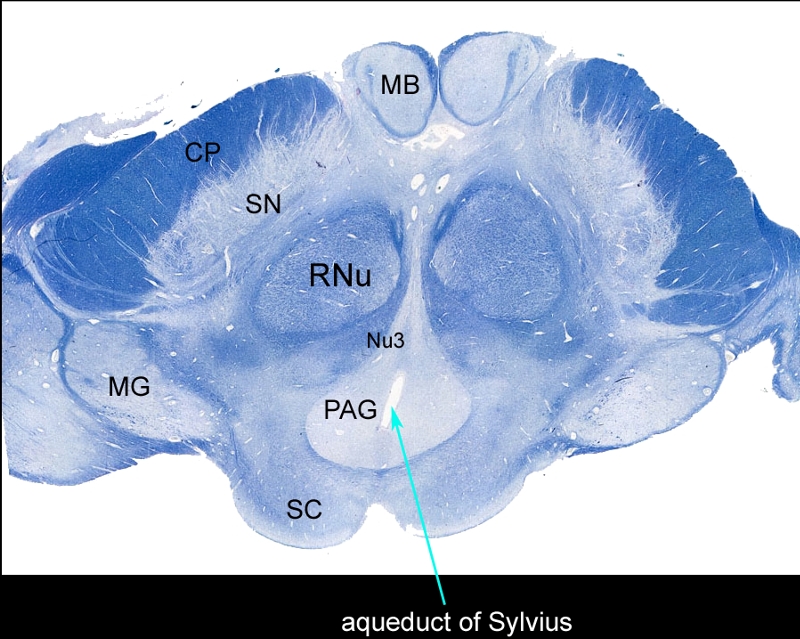Central Gray Matter – Periaqueductal Gray Matter
Ashley Davidoff MD
The Common Vein Copyright 2010
Definition
The periaqueductal gray (PAG) or the central gray is a confluence of gray matter within the tegmentum of the midbrain. Functionally it is involved with pain and temperature sensation, and probably is involved in defensive behavior, sexual instincts and particpates in maintaining conciousness.
|

Cerebral Peduncles in Axial Projection |
|
The midbrain in transverse plane illustrates the component structures, with the image reminiscent of the face of a baby pig.. Anteriorly the cerebral peduncles are followed by the substantia nigra, and the collilculi The anterior border of the midbrain incorporates the cerebral peduncles, and the substantia nigra (black – just posterior to the peduncles). Between the substantia nigra and the aqueduct is an area of the midbrain called the tegmentum (floor of the midbrain) Within the tegmentum other structures include red nuclii, oculomotor nuclii, periaquaductal gray, and the aqueduct of Sylvius which is border forming between the tegmentum anteriorly and the tectum (roof) posteriorly. The posterior end of the midbrain is bordered by the colliculi in the tectum.
Courtesy Ashley Davidoff MD copyright 2010 all rights reserved 94074b08a06bL.9s
|
|

Axial Anatomic Specimen through the Midbrain
Periaqueductal Gray Around the Aqueduct of Sylvius |
|
The anatomic section is an axial slice through the brain showing the structures of the midbrain. The most anterior structures of the midbrain are the cerebral peduncles followed by the substantia nigra, red nucleus, periaquaductal gray (PAG or central gray), aqueduct of Sylvius and finally the superior colliculus. Structures that are related to the midbrain anteriorly are the mamillary bodies and the optic tract. The hippocampus is positioned posterolaterally and the superior aspect of the cerebellum is seen posteriorly.
Courtesy Department of Anatomy and Neurobiology at Boston University School of Medicine Dr. Jennifer Luebke , and Dr. Douglas Rosene 97140b03c.9
|
|

Whole Mount of the Midbrain in Axial Projection |
|
The mounted and stained midbrain in transverse plane illustrates the component structures. The anterior border of the midbrain incorporates the cerebral peduncles (CP), and the substantia nigra (SN). Between the substantia nigra and the aqueduct (teal arrow) is an area of the midbrain called the tegmentum (floor of the midbrain) Within the tegmentum other structures include red nuclii (RNu), oculomotor nucleus (Nu3), periaquaductal gray (PAG), and the aqueduct of Sylvius which is border forming between the tegmentum anteriorly and the tectum (roof) posteriorly. The posterior end of the midbrain is bordered by the colliculi in the tectum. Note also the paired mamillary bodies anteriorly (MB) and the medial geniculate body (MG) posterolaterally
Courtesy Department of Anatomy and Neurobiology at Boston University School of Medicine Dr. Jennifer Luebke , and Dr. Douglas Rosene 98483L.8
|
DOMElement Object
(
[schemaTypeInfo] =>
[tagName] => table
[firstElementChild] => (object value omitted)
[lastElementChild] => (object value omitted)
[childElementCount] => 1
[previousElementSibling] => (object value omitted)
[nextElementSibling] => (object value omitted)
[nodeName] => table
[nodeValue] =>
Whole Mount of the Midbrain in Axial Projection
The mounted and stained midbrain in transverse plane illustrates the component structures. The anterior border of the midbrain incorporates the cerebral peduncles (CP), and the substantia nigra (SN). Between the substantia nigra and the aqueduct (teal arrow) is an area of the midbrain called the tegmentum (floor of the midbrain) Within the tegmentum other structures include red nuclii (RNu), oculomotor nucleus (Nu3), periaquaductal gray (PAG), and the aqueduct of Sylvius which is border forming between the tegmentum anteriorly and the tectum (roof) posteriorly. The posterior end of the midbrain is bordered by the colliculi in the tectum. Note also the paired mamillary bodies anteriorly (MB) and the medial geniculate body (MG) posterolaterally
Courtesy Department of Anatomy and Neurobiology at Boston University School of Medicine Dr. Jennifer Luebke , and Dr. Douglas Rosene 98483L.8
[nodeType] => 1
[parentNode] => (object value omitted)
[childNodes] => (object value omitted)
[firstChild] => (object value omitted)
[lastChild] => (object value omitted)
[previousSibling] => (object value omitted)
[nextSibling] => (object value omitted)
[attributes] => (object value omitted)
[ownerDocument] => (object value omitted)
[namespaceURI] =>
[prefix] =>
[localName] => table
[baseURI] =>
[textContent] =>
Whole Mount of the Midbrain in Axial Projection
The mounted and stained midbrain in transverse plane illustrates the component structures. The anterior border of the midbrain incorporates the cerebral peduncles (CP), and the substantia nigra (SN). Between the substantia nigra and the aqueduct (teal arrow) is an area of the midbrain called the tegmentum (floor of the midbrain) Within the tegmentum other structures include red nuclii (RNu), oculomotor nucleus (Nu3), periaquaductal gray (PAG), and the aqueduct of Sylvius which is border forming between the tegmentum anteriorly and the tectum (roof) posteriorly. The posterior end of the midbrain is bordered by the colliculi in the tectum. Note also the paired mamillary bodies anteriorly (MB) and the medial geniculate body (MG) posterolaterally
Courtesy Department of Anatomy and Neurobiology at Boston University School of Medicine Dr. Jennifer Luebke , and Dr. Douglas Rosene 98483L.8
)
DOMElement Object
(
[schemaTypeInfo] =>
[tagName] => td
[firstElementChild] => (object value omitted)
[lastElementChild] => (object value omitted)
[childElementCount] => 2
[previousElementSibling] =>
[nextElementSibling] =>
[nodeName] => td
[nodeValue] =>
The mounted and stained midbrain in transverse plane illustrates the component structures. The anterior border of the midbrain incorporates the cerebral peduncles (CP), and the substantia nigra (SN). Between the substantia nigra and the aqueduct (teal arrow) is an area of the midbrain called the tegmentum (floor of the midbrain) Within the tegmentum other structures include red nuclii (RNu), oculomotor nucleus (Nu3), periaquaductal gray (PAG), and the aqueduct of Sylvius which is border forming between the tegmentum anteriorly and the tectum (roof) posteriorly. The posterior end of the midbrain is bordered by the colliculi in the tectum. Note also the paired mamillary bodies anteriorly (MB) and the medial geniculate body (MG) posterolaterally
Courtesy Department of Anatomy and Neurobiology at Boston University School of Medicine Dr. Jennifer Luebke , and Dr. Douglas Rosene 98483L.8
[nodeType] => 1
[parentNode] => (object value omitted)
[childNodes] => (object value omitted)
[firstChild] => (object value omitted)
[lastChild] => (object value omitted)
[previousSibling] => (object value omitted)
[nextSibling] => (object value omitted)
[attributes] => (object value omitted)
[ownerDocument] => (object value omitted)
[namespaceURI] =>
[prefix] =>
[localName] => td
[baseURI] =>
[textContent] =>
The mounted and stained midbrain in transverse plane illustrates the component structures. The anterior border of the midbrain incorporates the cerebral peduncles (CP), and the substantia nigra (SN). Between the substantia nigra and the aqueduct (teal arrow) is an area of the midbrain called the tegmentum (floor of the midbrain) Within the tegmentum other structures include red nuclii (RNu), oculomotor nucleus (Nu3), periaquaductal gray (PAG), and the aqueduct of Sylvius which is border forming between the tegmentum anteriorly and the tectum (roof) posteriorly. The posterior end of the midbrain is bordered by the colliculi in the tectum. Note also the paired mamillary bodies anteriorly (MB) and the medial geniculate body (MG) posterolaterally
Courtesy Department of Anatomy and Neurobiology at Boston University School of Medicine Dr. Jennifer Luebke , and Dr. Douglas Rosene 98483L.8
)
DOMElement Object
(
[schemaTypeInfo] =>
[tagName] => td
[firstElementChild] => (object value omitted)
[lastElementChild] => (object value omitted)
[childElementCount] => 2
[previousElementSibling] =>
[nextElementSibling] =>
[nodeName] => td
[nodeValue] =>
Whole Mount of the Midbrain in Axial Projection
[nodeType] => 1
[parentNode] => (object value omitted)
[childNodes] => (object value omitted)
[firstChild] => (object value omitted)
[lastChild] => (object value omitted)
[previousSibling] => (object value omitted)
[nextSibling] => (object value omitted)
[attributes] => (object value omitted)
[ownerDocument] => (object value omitted)
[namespaceURI] =>
[prefix] =>
[localName] => td
[baseURI] =>
[textContent] =>
Whole Mount of the Midbrain in Axial Projection
)
DOMElement Object
(
[schemaTypeInfo] =>
[tagName] => table
[firstElementChild] => (object value omitted)
[lastElementChild] => (object value omitted)
[childElementCount] => 1
[previousElementSibling] => (object value omitted)
[nextElementSibling] => (object value omitted)
[nodeName] => table
[nodeValue] =>
Axial Anatomic Specimen through the Midbrain
Periaqueductal Gray Around the Aqueduct of Sylvius
The anatomic section is an axial slice through the brain showing the structures of the midbrain. The most anterior structures of the midbrain are the cerebral peduncles followed by the substantia nigra, red nucleus, periaquaductal gray (PAG or central gray), aqueduct of Sylvius and finally the superior colliculus. Structures that are related to the midbrain anteriorly are the mamillary bodies and the optic tract. The hippocampus is positioned posterolaterally and the superior aspect of the cerebellum is seen posteriorly.
Courtesy Department of Anatomy and Neurobiology at Boston University School of Medicine Dr. Jennifer Luebke , and Dr. Douglas Rosene 97140b03c.9
[nodeType] => 1
[parentNode] => (object value omitted)
[childNodes] => (object value omitted)
[firstChild] => (object value omitted)
[lastChild] => (object value omitted)
[previousSibling] => (object value omitted)
[nextSibling] => (object value omitted)
[attributes] => (object value omitted)
[ownerDocument] => (object value omitted)
[namespaceURI] =>
[prefix] =>
[localName] => table
[baseURI] =>
[textContent] =>
Axial Anatomic Specimen through the Midbrain
Periaqueductal Gray Around the Aqueduct of Sylvius
The anatomic section is an axial slice through the brain showing the structures of the midbrain. The most anterior structures of the midbrain are the cerebral peduncles followed by the substantia nigra, red nucleus, periaquaductal gray (PAG or central gray), aqueduct of Sylvius and finally the superior colliculus. Structures that are related to the midbrain anteriorly are the mamillary bodies and the optic tract. The hippocampus is positioned posterolaterally and the superior aspect of the cerebellum is seen posteriorly.
Courtesy Department of Anatomy and Neurobiology at Boston University School of Medicine Dr. Jennifer Luebke , and Dr. Douglas Rosene 97140b03c.9
)
DOMElement Object
(
[schemaTypeInfo] =>
[tagName] => td
[firstElementChild] => (object value omitted)
[lastElementChild] => (object value omitted)
[childElementCount] => 2
[previousElementSibling] =>
[nextElementSibling] =>
[nodeName] => td
[nodeValue] =>
The anatomic section is an axial slice through the brain showing the structures of the midbrain. The most anterior structures of the midbrain are the cerebral peduncles followed by the substantia nigra, red nucleus, periaquaductal gray (PAG or central gray), aqueduct of Sylvius and finally the superior colliculus. Structures that are related to the midbrain anteriorly are the mamillary bodies and the optic tract. The hippocampus is positioned posterolaterally and the superior aspect of the cerebellum is seen posteriorly.
Courtesy Department of Anatomy and Neurobiology at Boston University School of Medicine Dr. Jennifer Luebke , and Dr. Douglas Rosene 97140b03c.9
[nodeType] => 1
[parentNode] => (object value omitted)
[childNodes] => (object value omitted)
[firstChild] => (object value omitted)
[lastChild] => (object value omitted)
[previousSibling] => (object value omitted)
[nextSibling] => (object value omitted)
[attributes] => (object value omitted)
[ownerDocument] => (object value omitted)
[namespaceURI] =>
[prefix] =>
[localName] => td
[baseURI] =>
[textContent] =>
The anatomic section is an axial slice through the brain showing the structures of the midbrain. The most anterior structures of the midbrain are the cerebral peduncles followed by the substantia nigra, red nucleus, periaquaductal gray (PAG or central gray), aqueduct of Sylvius and finally the superior colliculus. Structures that are related to the midbrain anteriorly are the mamillary bodies and the optic tract. The hippocampus is positioned posterolaterally and the superior aspect of the cerebellum is seen posteriorly.
Courtesy Department of Anatomy and Neurobiology at Boston University School of Medicine Dr. Jennifer Luebke , and Dr. Douglas Rosene 97140b03c.9
)
DOMElement Object
(
[schemaTypeInfo] =>
[tagName] => td
[firstElementChild] => (object value omitted)
[lastElementChild] => (object value omitted)
[childElementCount] => 3
[previousElementSibling] =>
[nextElementSibling] =>
[nodeName] => td
[nodeValue] =>
Axial Anatomic Specimen through the Midbrain
Periaqueductal Gray Around the Aqueduct of Sylvius
[nodeType] => 1
[parentNode] => (object value omitted)
[childNodes] => (object value omitted)
[firstChild] => (object value omitted)
[lastChild] => (object value omitted)
[previousSibling] => (object value omitted)
[nextSibling] => (object value omitted)
[attributes] => (object value omitted)
[ownerDocument] => (object value omitted)
[namespaceURI] =>
[prefix] =>
[localName] => td
[baseURI] =>
[textContent] =>
Axial Anatomic Specimen through the Midbrain
Periaqueductal Gray Around the Aqueduct of Sylvius
)
DOMElement Object
(
[schemaTypeInfo] =>
[tagName] => table
[firstElementChild] => (object value omitted)
[lastElementChild] => (object value omitted)
[childElementCount] => 1
[previousElementSibling] => (object value omitted)
[nextElementSibling] => (object value omitted)
[nodeName] => table
[nodeValue] =>
Cerebral Peduncles in Axial Projection
The midbrain in transverse plane illustrates the component structures, with the image reminiscent of the face of a baby pig.. Anteriorly the cerebral peduncles are followed by the substantia nigra, and the collilculi The anterior border of the midbrain incorporates the cerebral peduncles, and the substantia nigra (black – just posterior to the peduncles). Between the substantia nigra and the aqueduct is an area of the midbrain called the tegmentum (floor of the midbrain) Within the tegmentum other structures include red nuclii, oculomotor nuclii, periaquaductal gray, and the aqueduct of Sylvius which is border forming between the tegmentum anteriorly and the tectum (roof) posteriorly. The posterior end of the midbrain is bordered by the colliculi in the tectum.
Courtesy Ashley Davidoff MD copyright 2010 all rights reserved 94074b08a06bL.9s
[nodeType] => 1
[parentNode] => (object value omitted)
[childNodes] => (object value omitted)
[firstChild] => (object value omitted)
[lastChild] => (object value omitted)
[previousSibling] => (object value omitted)
[nextSibling] => (object value omitted)
[attributes] => (object value omitted)
[ownerDocument] => (object value omitted)
[namespaceURI] =>
[prefix] =>
[localName] => table
[baseURI] =>
[textContent] =>
Cerebral Peduncles in Axial Projection
The midbrain in transverse plane illustrates the component structures, with the image reminiscent of the face of a baby pig.. Anteriorly the cerebral peduncles are followed by the substantia nigra, and the collilculi The anterior border of the midbrain incorporates the cerebral peduncles, and the substantia nigra (black – just posterior to the peduncles). Between the substantia nigra and the aqueduct is an area of the midbrain called the tegmentum (floor of the midbrain) Within the tegmentum other structures include red nuclii, oculomotor nuclii, periaquaductal gray, and the aqueduct of Sylvius which is border forming between the tegmentum anteriorly and the tectum (roof) posteriorly. The posterior end of the midbrain is bordered by the colliculi in the tectum.
Courtesy Ashley Davidoff MD copyright 2010 all rights reserved 94074b08a06bL.9s
)
DOMElement Object
(
[schemaTypeInfo] =>
[tagName] => td
[firstElementChild] => (object value omitted)
[lastElementChild] => (object value omitted)
[childElementCount] => 2
[previousElementSibling] =>
[nextElementSibling] =>
[nodeName] => td
[nodeValue] =>
The midbrain in transverse plane illustrates the component structures, with the image reminiscent of the face of a baby pig.. Anteriorly the cerebral peduncles are followed by the substantia nigra, and the collilculi The anterior border of the midbrain incorporates the cerebral peduncles, and the substantia nigra (black – just posterior to the peduncles). Between the substantia nigra and the aqueduct is an area of the midbrain called the tegmentum (floor of the midbrain) Within the tegmentum other structures include red nuclii, oculomotor nuclii, periaquaductal gray, and the aqueduct of Sylvius which is border forming between the tegmentum anteriorly and the tectum (roof) posteriorly. The posterior end of the midbrain is bordered by the colliculi in the tectum.
Courtesy Ashley Davidoff MD copyright 2010 all rights reserved 94074b08a06bL.9s
[nodeType] => 1
[parentNode] => (object value omitted)
[childNodes] => (object value omitted)
[firstChild] => (object value omitted)
[lastChild] => (object value omitted)
[previousSibling] => (object value omitted)
[nextSibling] => (object value omitted)
[attributes] => (object value omitted)
[ownerDocument] => (object value omitted)
[namespaceURI] =>
[prefix] =>
[localName] => td
[baseURI] =>
[textContent] =>
The midbrain in transverse plane illustrates the component structures, with the image reminiscent of the face of a baby pig.. Anteriorly the cerebral peduncles are followed by the substantia nigra, and the collilculi The anterior border of the midbrain incorporates the cerebral peduncles, and the substantia nigra (black – just posterior to the peduncles). Between the substantia nigra and the aqueduct is an area of the midbrain called the tegmentum (floor of the midbrain) Within the tegmentum other structures include red nuclii, oculomotor nuclii, periaquaductal gray, and the aqueduct of Sylvius which is border forming between the tegmentum anteriorly and the tectum (roof) posteriorly. The posterior end of the midbrain is bordered by the colliculi in the tectum.
Courtesy Ashley Davidoff MD copyright 2010 all rights reserved 94074b08a06bL.9s
)
DOMElement Object
(
[schemaTypeInfo] =>
[tagName] => td
[firstElementChild] => (object value omitted)
[lastElementChild] => (object value omitted)
[childElementCount] => 2
[previousElementSibling] =>
[nextElementSibling] =>
[nodeName] => td
[nodeValue] =>
Cerebral Peduncles in Axial Projection
[nodeType] => 1
[parentNode] => (object value omitted)
[childNodes] => (object value omitted)
[firstChild] => (object value omitted)
[lastChild] => (object value omitted)
[previousSibling] => (object value omitted)
[nextSibling] => (object value omitted)
[attributes] => (object value omitted)
[ownerDocument] => (object value omitted)
[namespaceURI] =>
[prefix] =>
[localName] => td
[baseURI] =>
[textContent] =>
Cerebral Peduncles in Axial Projection
)



